- Home
- George MacDonald
Lilith Page 5
Lilith Read online
Page 5
“You try my power of belief!” I said.
“You take me for a madman, probably?”
“You do not look like one.”
“A liar then?”
“You give me no ground to think you such.”
“Only you do not believe me?”
“I will go out of that door with you if you like: I believe in you enough to risk the attempt.”
“The blunder all my children make!” he murmured. “The only door out is the door in!”
I began to think he must be crazy. He sat silent for a moment, his head resting on his hand, his elbow on the table, and his eyes on the books before him.
“A book,” he said louder, “is a door in, and therefore a door out.—I see old Sir Up’ard,” he went on, closing his eyes, “and my heart swells with love to him:—what world is he in?”
“The world of your heart!” I replied; “—that is, the idea of him is there.”
“There is one world then at least on which your hall-door does not open?”
“I grant you so much; but the things in that world are not things to have and to hold.”
“Think a little farther,” he rejoined: “did anything ever become yours, except by getting into that world?—The thought is beyond you, however, at present!—I tell you there are more worlds, and more doors to them, than you will think of in many years!”
He rose, left the library, crossed the hall, and went straight up to the garret, familiar evidently with every turn. I followed, studying his back. His hair hung down long and dark, straight and glossy. His coat was wide and reached to his heels. His shoes seemed too large for him.
In the garret a light came through at the edges of the great roofing slabs, and showed us parts where was no flooring, and we must step from joist to joist: in the middle of one of these spaces rose a partition, with a door: through it I followed Mr. Raven into a small, obscure chamber, whose top contracted as it rose, and went slanting through the roof.
“That is the door I spoke of,” he said, pointing to an oblong mirror that stood on the floor and leaned against the wall. I went in front of it, and saw our figures dimly reflected in its dusty face. There was something about it that made me uneasy. It looked old-fashioned and neglected, but, notwithstanding its ordinary seeming, the eagle, perched with outstretched wings on the top, appeared threatful.
“As a mirror,” said the librarian, “it has grown dingy with age; but that is no matter: its clearness depends on the light.”
“Light!” I rejoined; “there is no light here!”
He did not answer me, but began to pull at a little chain on the opposite wall. I heard a creaking: the top of the chamber was turning slowly round. He ceased pulling, looked at his watch, and began to pull again.
“We arrive almost to the moment!” he said; “it is on the very stroke of noon!”
The top went creaking and revolving for a minute or so. Then he pulled two other chains, now this, now that, and returned to the first. A moment more and the chamber grew much clearer: a patch of sunlight had fallen upon a mirror on the wall opposite that against which the other leaned, and on the dust I saw the path of the reflected rays to the mirror on the ground. But from the latter none were returned; they seemed to go clean through; there was nowhere in the chamber a second patch of light!
“Where are the sunrays gone?” I cried.
“That I cannot tell,” returned Mr. Raven; “—back, perhaps, to where they came from first. They now belong, I fancy, to a sense not yet developed in us.”
He then talked of the relations of mind to matter, and of senses to qualities, in a way I could only a little understand, whence he went on to yet stranger things which I could not at all comprehend. He spoke much about dimensions, telling me that there were many more than three, some of them concerned with powers which were indeed in us, but of which as yet we knew absolutely nothing. His words, however, I confess, took little more hold of me than the light did of the mirror, for I thought he hardly knew what he was saying.
Suddenly I was aware that our forms had gone from the mirror, which seemed full of a white mist. As I gazed I saw, growing gradually visible beyond the mist, the tops of a range of mountains, which became clearer and clearer. Soon the mist vanished entirely, uncovering the face of a wide heath, on which, at some distance, was the figure of a man moving swiftly away. I turned to address my companion; he was no longer by my side. I looked again at the form in the mirror, and recognised the wide coat flying, the black hair lifting in a wind that did not touch me. I rushed in terror from the place.
CHAPTER IX. I REPENT
I laid the manuscript down, consoled to find that my father had had a peep into that mysterious world, and that he knew Mr. Raven.
Then I remembered that I had never heard the cause or any circumstance of my father’s death, and began to believe that he must at last have followed Mr. Raven, and not come back; whereupon I speedily grew ashamed of my flight. What wondrous facts might I not by this time have gathered concerning life and death, and wide regions beyond ordinary perception! Assuredly the Ravens were good people, and a night in their house would nowise have hurt me! They were doubtless strange, but it was faculty in which the one was peculiar, and beauty in which the other was marvellous! And I had not believed in them! had treated them as unworthy of my confidence, as harbouring a design against me! The more I thought of my behaviour to them, the more disgusted I became with myself. Why should I have feared such dead? To share their holy rest was an honour of which I had proved myself unworthy! What harm could that sleeping king, that lady with the wound in her palm, have done me? I fell a longing after the sweet and stately stillness of their two countenances, and wept. Weeping I threw myself on a couch, and suddenly fell asleep.
As suddenly I woke, feeling as if some one had called me. The house was still as an empty church. A blackbird was singing on the lawn. I said to myself, “I will go and tell them I am ashamed, and will do whatever they would have me do!” I rose, and went straight up the stairs to the garret.
The wooden chamber was just as when first I saw it, the mirror dimly reflecting everything before it. It was nearly noon, and the sun would be a little higher than when first I came: I must raise the hood a little, and adjust the mirrors accordingly! If I had but been in time to see Mr. Raven do it!
I pulled the chains, and let the light fall on the first mirror. I turned then to the other: there were the shapes of the former vision—distinguishable indeed, but tremulous like a landscape in a pool ruffled by “a small pipling wind!” I touched the glass; it was impermeable.
Suspecting polarisation as the thing required, I shifted and shifted the mirrors, changing their relation, until at last, in a great degree, so far as I was concerned, by chance, things came right between them, and I saw the mountains blue and steady and clear. I stepped forward, and my feet were among the heather.
All I knew of the way to the cottage was that we had gone through a pine-forest. I passed through many thickets and several small fir-woods, continually fancying afresh that I recognised something of the country; but I had come upon no forest, and now the sun was near the horizon, and the air had begun to grow chill with the coming winter, when, to my delight, I saw a little black object coming toward me: it was indeed the raven!
I hastened to meet him.
“I beg your pardon, sir, for my rudeness last night,” I said. “Will you take me with you now? I heartily confess I do not deserve it.”
“Ah!” he returned, and looked up. Then, after a brief pause, “My wife does not expect you to-night,” he said. “She regrets that we at all encouraged your staying last week.”
“Take me to her that I may tell her how sorry I am,” I begged humbly.
“It is of no use,” he answered. “Your night was not come then, or you would not have left us. It is not come now, and I cannot show you the way. The dead were rejoicing under their daisies—they all lie among the roots of the flowers of heaven—
at the thought of your delight when the winter should be past, and the morning with its birds come: ere you left them, they shivered in their beds. When the spring of the universe arrives,—but that cannot be for ages yet! how many, I do not know—and do not care to know.”
“Tell me one thing, I beg of you, Mr. Raven: is my father with you? Have you seen him since he left the world?”
“Yes; he is with us, fast asleep. That was he you saw with his arm on the coverlet, his hand half closed.”
“Why did you not tell me? That I should have been so near him, and not know!”
“And turn your back on him!” corrected the raven.
“I would have lain down at once had I known!”
“I doubt it. Had you been ready to lie down, you would have known him!—Old Sir Up’ard,” he went on, “and your twice great-grandfather, both are up and away long ago. Your great-grandfather has been with us for many a year; I think he will soon begin to stir. You saw him last night, though of course you did not know him.”
“Why OF COURSE?”
“Because he is so much nearer waking than you. No one who will not sleep can ever wake.”
“I do not at all understand you!”
“You turned away, and would not understand!” I held my peace.—But if I did not say something, he would go!
“And my grandfather—is he also with you?” I asked.
“No; he is still in the Evil Wood, fighting the dead.”
“Where is the Evil Wood, that I may find him?”
“You will not find him; but you will hardly miss the wood. It is the place where those who will not sleep, wake up at night, to kill their dead and bury them.”
“I cannot understand you!”
“Naturally not. Neither do I understand you; I can read neither your heart nor your face. When my wife and I do not understand our children, it is because there is not enough of them to be understood. God alone can understand foolishness.”
“Then,” I said, feeling naked and very worthless, “will you be so good as show me the nearest way home? There are more ways than one, I know, for I have gone by two already.”
“There are indeed many ways.”
“Tell me, please, how to recognise the nearest.”
“I cannot,” answered the raven; “you and I use the same words with different meanings. We are often unable to tell people what they NEED to know, because they WANT to know something else, and would therefore only misunderstand what we said. Home is ever so far away in the palm of your hand, and how to get there it is of no use to tell you. But you will get there; you must get there; you have to get there. Everybody who is not at home, has to go home. You thought you were at home where I found you: if that had been your home, you could not have left it. Nobody can leave home. And nobody ever was or ever will be at home without having gone there.”
“Enigma treading on enigma!” I exclaimed. “I did not come here to be asked riddles.”
“No; but you came, and found the riddles waiting for you! Indeed you are yourself the only riddle. What you call riddles are truths, and seem riddles because you are not true.”
“Worse and worse!” I cried.
“And you MUST answer the riddles!” he continued. “They will go on asking themselves until you understand yourself. The universe is a riddle trying to get out, and you are holding your door hard against it.”
“Will you not in pity tell me what I am to do—where I must go?”
“How should I tell YOUR to-do, or the way to it?”
“If I am not to go home, at least direct me to some of my kind.”
“I do not know of any. The beings most like you are in that direction.”
He pointed with his beak. I could see nothing but the setting sun, which blinded me.
“Well,” I said bitterly, “I cannot help feeling hardly treated—taken from my home, abandoned in a strange world, and refused instruction as to where I am to go or what I am to do!”
“You forget,” said the raven, “that, when I brought you and you declined my hospitality, you reached what you call home in safety: now you are come of yourself! Good night.”
He turned and walked slowly away, with his beak toward the ground. I stood dazed. It was true I had come of myself, but had I not come with intent of atonement? My heart was sore, and in my brain was neither quest nor purpose, hope nor desire. I gazed after the raven, and would have followed him, but felt it useless.
All at once he pounced on a spot, throwing the whole weight of his body on his bill, and for some moments dug vigorously. Then with a flutter of his wings he threw back his head, and something shot from his bill, cast high in the air. That moment the sun set, and the air at once grew very dusk, but the something opened into a soft radiance, and came pulsing toward me like a firefly, but with a much larger and a yellower light. It flew over my head. I turned and followed it.
Here I interrupt my narrative to remark that it involves a constant struggle to say what cannot be said with even an approach to precision, the things recorded being, in their nature and in that of the creatures concerned in them, so inexpressibly different from any possible events of this economy, that I can present them only by giving, in the forms and language of life in this world, the modes in which they affected me—not the things themselves, but the feelings they woke in me. Even this much, however, I do with a continuous and abiding sense of failure, finding it impossible to present more than one phase of a multitudinously complicated significance, or one concentric sphere of a graduated embodiment. A single thing would sometimes seem to be and mean many things, with an uncertain identity at the heart of them, which kept constantly altering their look. I am indeed often driven to set down what I know to be but a clumsy and doubtful representation of the mere feeling aimed at, none of the communicating media of this world being fit to convey it, in its peculiar strangeness, with even an approach to clearness or certainty. Even to one who knew the region better than myself, I should have no assurance of transmitting the reality of my experience in it. While without a doubt, for instance, that I was actually regarding a scene of activity, I might be, at the same moment, in my consciousness aware that I was perusing a metaphysical argument.
CHAPTER X. THE BAD BURROW
As the air grew black and the winter closed swiftly around me, the fluttering fire blazed out more luminous, and arresting its flight, hovered waiting. So soon as I came under its radiance, it flew slowly on, lingering now and then above spots where the ground was rocky. Every time I looked up, it seemed to have grown larger, and at length gave me an attendant shadow. Plainly a bird-butterfly, it flew with a certain swallowy double. Its wings were very large, nearly square, and flashed all the colours of the rainbow. Wondering at their splendour, I became so absorbed in their beauty that I stumbled over a low rock, and lay stunned. When I came to myself, the creature was hovering over my head, radiating the whole chord of light, with multitudinous gradations and some kinds of colour I had never before seen. I rose and went on, but, unable to take my eyes off the shining thing to look to my steps, I struck my foot against a stone. Fearing then another fall, I sat down to watch the little glory, and a great longing awoke in me to have it in my hand. To my unspeakable delight, it began to sink toward me. Slowly at first, then swiftly it sank, growing larger as it came nearer. I felt as if the treasure of the universe were giving itself to me—put out my hand, and had it. But the instant I took it, its light went out; all was dark as pitch; a dead book with boards outspread lay cold and heavy in my hand. I threw it in the air—only to hear it fall among the heather. Burying my face in my hands, I sat in motionless misery.
But the cold grew so bitter that, fearing to be frozen, I got up. The moment I was on my feet, a faint sense of light awoke in me. “Is it coming to life?” I cried, and a great pang of hope shot through me. Alas, no! it was the edge of a moon peering up keen and sharp over a level horizon! She brought me light—but no guidance! SHE would not hover over me, would not wait on
my faltering steps! She could but offer me an ignorant choice!
With a full face she rose, and I began to see a little about me. Westward of her, and not far from me, a range of low hills broke the horizon-line: I set out for it.
But what a night I had to pass ere I reached it! The moon seemed to know something, for she stared at me oddly. Her look was indeed icy-cold, but full of interest, or at least curiosity. She was not the same moon I had known on the earth; her face was strange to me, and her light yet stranger. Perhaps it came from an unknown sun! Every time I looked up, I found her staring at me with all her might! At first I was annoyed, as at the rudeness of a fellow creature; but soon I saw or fancied a certain wondering pity in her gaze: why was I out in her night? Then first I knew what an awful thing it was to be awake in the universe: I WAS, and could not help it!
As I walked, my feet lost the heather, and trod a bare spongy soil, something like dry, powdery peat. To my dismay it gave a momentary heave under me; then presently I saw what seemed the ripple of an earthquake running on before me, shadowy in the low moon. It passed into the distance; but, while yet I stared after it, a single wave rose up, and came slowly toward me. A yard or two away it burst, and from it, with a scramble and a bound, issued an animal like a tiger. About his mouth and ears hung clots of mould, and his eyes winked and flamed as he rushed at me, showing his white teeth in a soundless snarl. I stood fascinated, unconscious of either courage or fear. He turned his head to the ground, and plunged into it.
“That moon is affecting my brain,” I said as I resumed my journey. “What life can be here but the phantasmic—the stuff of which dreams are made? I am indeed walking in a vain show!”
Thus I strove to keep my heart above the waters of fear, nor knew that she whom I distrusted was indeed my defence from the realities I took for phantoms: her light controlled the monsters, else had I scarce taken a second step on the hideous ground. “I will not be appalled by that which only seems!” I said to myself, yet felt it a terrible thing to walk on a sea where such fishes disported themselves below. With that, a step or two from me, the head of a worm began to come slowly out of the earth, as big as that of a polar bear and much resembling it, with a white mane to its red neck. The drawing wriggles with which its huge length extricated itself were horrible, yet I dared not turn my eyes from them. The moment its tail was free, it lay as if exhausted, wallowing in feeble effort to burrow again.

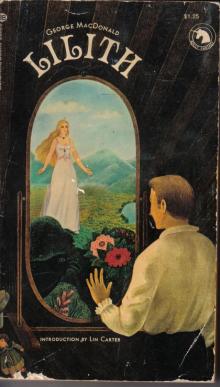 Lilith: A Romance
Lilith: A Romance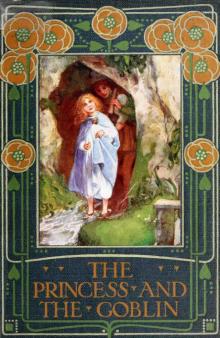 The Princess and the Goblin
The Princess and the Goblin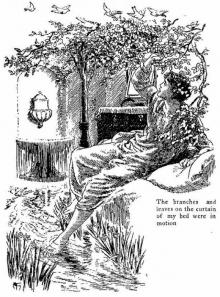 Phantastes: A Faerie Romance for Men and Women
Phantastes: A Faerie Romance for Men and Women A Double Story
A Double Story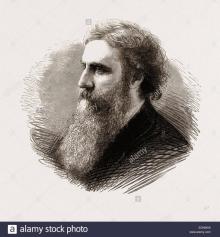 St. George and St. Michael
St. George and St. Michael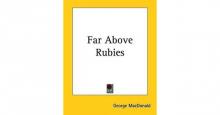 Far Above Rubies
Far Above Rubies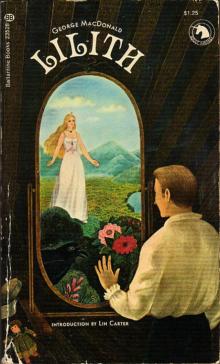 Lilith
Lilith